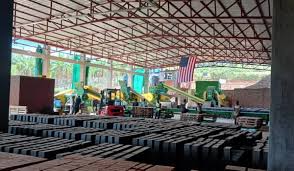Rwanda is set to open its first eco-industrial park for building materials in Rwamagana District, located in the eastern part of the country. The new park will focus on producing eco-friendly and low-carbon construction materials using clay and other natural resources found locally. This project was made public by the country’s Minister of Trade and Industry, Mr Prudence Sebahizi, in an interview with The New Times.
The eco-park will be built in Gahengeri Sector in Rwamagana, and it is one of the key efforts by the Rwandan government to promote sustainable construction and reduce dependence on imported building materials. The project also supports Rwanda’s goal of responsible industrialisation and fast urban growth.
According to the Minister, the park will produce different types of construction materials such as clay bricks, bamboo products, Limestone Calcined Clay Cement, also called LC3, and other recycled items. All these will be made from local raw materials. The move is expected to reduce import costs and create more job opportunities for Rwandans.
Mr Prudence Sebahizi said the eco-park will help small and large producers in the construction industry. Brickmakers, cement companies, recyclers and local artisans will all benefit from new training opportunities and skill development programmes that will be available in the park. He added that both skilled and unskilled workers will receive support to improve the quality and standard of locally made materials.
The eco-park will operate under a community-based model that allows private companies to work in the park. These companies must follow strict environmental rules. The government has already planned to invest over Rwf1 billion during the 2025–2026 budget year to provide infrastructure and facilities needed for the park to operate effectively.
This park is part of Rwanda’s bigger plan to grow its housing sector and provide affordable homes for its citizens. Officials say the country spent about $566 million on imported building materials in 2024 alone. By encouraging the use of natural materials like clay and bamboo, Rwanda hopes to cut this expense and produce cheaper construction goods at home.
Rwamagana joins other secondary cities in Rwanda that have been chosen for green development. With support from the German development agency KfW, the government recently set aside about Rwf30 billion for green and gender-sensitive public spaces in five cities, including Rwamagana.
The park also complements ongoing projects under the Green City Kigali Master Plan. That plan aims to promote eco-friendly housing with energy-saving buildings, proper water management and climate-resilient infrastructure.
Traditional building systems like the rukarakara mud bricks, which are common in Rwanda, will also be modernised. By mixing local soil with minimal cement, the government wants to raise construction standards while reducing environmental impact. Small-scale producers of rukarakara bricks are expected to benefit from this support, as many of them work without proper equipment or government backing.
Rwanda’s capital city, Kigali, faces a serious housing shortage. Officials say Kigali needs about 25,000 new affordable homes each year, but only about 2,600 were built in the last ten years. One of the main problems is the high cost of building materials like cement and steel, most of which are imported. The new eco-park is seen as a solution that can make building materials more affordable and available.
In addition to helping the housing sector, the eco-park will support efforts to fight climate change. Rwanda, like many African countries, faces threats such as floods, heatwaves and landslides. Using nature-based and low-carbon building methods is expected to help protect communities and improve livelihoods.
The economic gains from the eco-park are also expected to be wide. Jobs will be created in production, processing, sales, training and research. Small and medium businesses, as well as private investors, will be key players in running the park. The government will support them with incentives, as long as they follow the required environmental rules.
Rwanda’s move is being watched by other African countries. Experts say it could serve as a good example of how to combine sustainable development with affordable housing and job creation. If successful, the Rwamagana eco-park may inspire similar projects in other parts of the continent.
By bringing together old methods of building with new technology and environmental thinking, Rwanda is setting up a strong foundation for long-term, inclusive and climate-friendly development.
